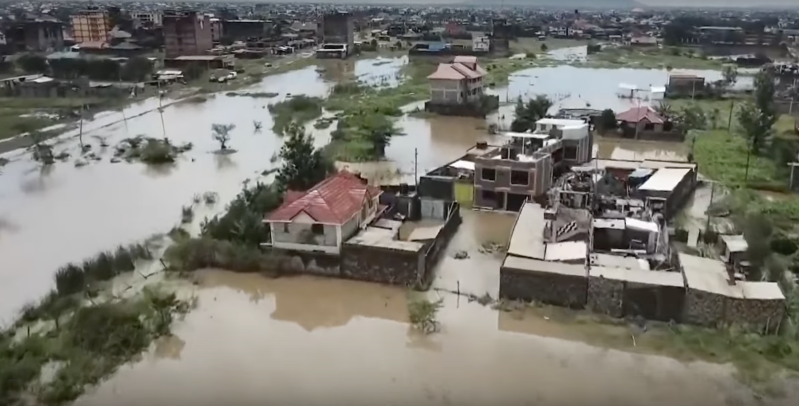
Adverse weather conditions over the last six months to June 2024 has led to thousands of deaths and an economic loss of $41 billion, at the very least. This is according to a report by Christian Aid that mapped the impact of extreme weather in four of the most affected regions in the world.
East Africa recorded one of the highest levels of rainfall in the recent past resulting in devastating floods and landslides. The report, titled - Climate breakdown 2024: 6 months of Climate Chaos since COP28 - states that the environmental disasters claimed 559 lives and displaced 400,000 others in East Africa.
“The heavy rains and flooding killed over 12,000 livestock and destroyed nearly 48,000 acres of cropland in Kenya alone. In Burundi, at least 19,000 homes and 200 classrooms were destroyed, and 10% of the farmland flooded,” notes the report.
The above average rainfall resulted in full capacity dams forcing countries like Uganda to release the excess water further downstream. Christian Aid projects that this will cause flooding in countries along the Nile river, especially in South Sudan.
“In South Sudan, more than 60% of the population is expected to be food insecure this year. Two million people in the country are internally displaced, with hundreds of thousands more entering the country to avoid conflict in Sudan,” warns Christian Aid.
Other countries in the region that experienced high levels of rainfall include Somalia, Rwanda, Ethiopia and Tanzania - whose coast was hit by Cyclone Hidaya in early May. In the Democratic Republic of Congo (DRC), floods and two major landslides claimed over 317 lives between December 2023 and January 2024.
Citing a climate attribution study, the report links the recent adverse weather conditions to climate change despite El Nino conditions in East Africa. Additionally, poor urban planning and deforestation increased the impact of the floods in cities such as Nairobi, Dar es Salaam and Mogadishu where burst sewers exposed residents to water-borne diseases.
“This year’s floods came after a three-year drought in the region, which was also hit by extreme rainfall in October and November 2023 - two events already found to have been made more severe due to climate change,” asserts the Christian Aid report.
Speaking to Christian Daily International, Anglican Alliance Global Lead for Resilience and Disaster Response, Nicholas Pande, said the floods in East Africa exposed the weak disaster preparedness systems.
“A majority of the affected persons in Kenya and other parts of the region were along riparian settlements. When the rivers burst their banks, the rescue efforts were slow. Early warning systems could have helped evacuate people from high risk areas in good time,” said Pande.
The report calls for urgent implementation of action points agreed in Dubai during the UN climate conference, COP28, in November 2023. Countries agreed to move away from fossil fuels to reduce climate impact, and set up a Loss and Damage fund to compensate countries most affected by climate change.
“The countries most vulnerable to climate change cannot afford further delays to deliver COP pledges. At Bonn [Climate Change Conference], countries must agree specific and urgent action to support countries impacted by climate change on adaptation, mitigation and energy transition efforts as well as Loss and Damage,” recommends the report.
Other countries and regions that experienced devastating climate-related disasters include Brazil, Southwest Asia and India. In southern Brazil, floods in April and May killed 169 people and displaced over 600,000 others. 56 people are still unaccounted for since then.
In the United Arab Emirates (UAE), Dubai received a year’s worth of rainfall in 24 hours, resulting in unusual flooding that shut the city’s busy airport. “Flooding at the Dubai International Airport led to over 1,200 flights being canceled. All forms of transport were disrupted, with an estimated $8 billion in aircraft assets exposed on the tarmac. The deluge forced authorities to close schools and businesses, and destroyed commercial real estate and luxury cars,” the report said.
India, Bangladesh, Thailand, Palestine, the Philippines, Cambodia and Myanmar faced soaring unprecedented temperatures with some cities recording temperatures of up to 50°C in the first quarter of 2024. Schools were shut down and labour productivity impacted across South and SouthEast Asia.





